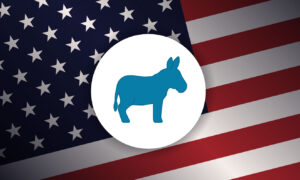The Scoop: Harris looks to fire up base heading into first debate
Plus: Google faces employee heat over AI rules; German navy goes viral after blaring Darth Vader march through London.

Vice President Kamala Harris formally accepted the Democrat’s presidential nomination on Thursday night, using the final day of her party’s convention to highlight who she is as a person and themes of her administration if elected.
“Never let anyone tell you who you are,” Harris said to a packed crowd in Chicago and tens of thousands of prospective voters watching live at home. “You show them who you are.”
Thursday night was one of the first times Harris spoke directly to American voters since replacing her former running mate on the campaign trail last month.
During her nearly 45-minute speech, Harris spoke of her middle-class upbringing and how her parents – Jamaican and Indian immigrants – helped shape her political career. She also touched on several campaign-related themes, such as working to create an “opportunity economy where everyone has a chance to compete and a chance to succeed.” The country’s housing shortage was another topic.
Her comments, while powerful, didn’t highlight any of her specific campaign platforms or policies or how she planned to differentiate herself from Biden, whom she’d served under for the past four years. However, they did draw applause from the crowd, some of whom may have been on the fence about her candidacy only a few weeks ago.
Why it matters: Any campaign – whether it’s for a product launch or a political candidate – revolves around brand and messaging.
In many cases, political campaigns spend months developing policies and platforms, as well as how to convey that to would-be voters. Only Harris wasn’t afforded that same time luxury, being thrust into the heart of election season just five weeks ago.
Since June, Harris’ approval ratings have soared – increasing 13 percentage points to 47% with 93% of Democrats, 41% of independents and 5% of Republicans holding positive opinions of her, according to a recent Gallup poll.
Harris used her DNC speech to promote a “new way forward” – a general refutation of the political divisiveness developed under the leadership of former President Donald Trump. “That speech was a call, and an invitation to American voters to put the politics of the last 10 years behind us,” Terry Moran, ABC’s Senior National Correspondent, said.
However, with only 73 days until Election Day, Harris still hasn’t really started a national campaign to appeal to would-be voters. As Vox reported on Tuesday: “Harris has at times briefly answered questions from reporters publicly — and has reportedly spoken to her traveling press pool off the record. But she’s done no formal interviews and held no formal press conferences.”
Harris and her advisers have no doubt spent that time honing a platform ahead of the upcoming debate(s). But she “faces the challenge of charting a distinct agenda while still serving under her unpopular boss, making it difficult to disavow Biden’s policy stances,” according to the Wall Street Journal.
While it’s assumed many of Harris’ policies will closely mirror those she and Biden were working on or planning to work on, that needs to be communicated in her own voice. On Aug. 16, the Harris team unveiled a slew of economic policies but she didn’t mention them at least for a moment while the whole country was watching.
“Of course, we can’t discount the fact that she’s the sitting vice president, but this is going to look different, and it is going to feel (like) a material change,” Rohini Kosoglu, a Harris policy adviser, told the WSJ.
Not leaning into those policy plans so explicitly potentially leaves the Harris/Walz ticket vulnerable to attacks about why she didn’t do more to address those concerns during her term as VP.
In light of firm campaign promises and proposals, the Democratic Party used the four-day convention to promote general themes such as returning to hope and attacking Trump and his running mate, Sen. JD Vance, who Transportation Secretary Pete Buttigieg described as “one of those guys who thinks if you don’t live the life he has in mind for you, then you don’t count.“
That approach will do a great job lighting a fire under the base, but it’s likely not going to be enough to convince undecided voters. In the days leading up to her debate with Trump, Harris and team need to lean into specific policies to highlight what a Harris/Walz administration would look like.
The first debate is Sept. 10.
Editor’s Top Reads:
- Nearly 200 workers at Google DeepMind – the company’s artificial intelligence division – signed a letter calling on the company to drop its contracts with military organizations, according to Time. The letter from May 16 highlighted staff concerns that Google was violating its own AI rules by selling its tech to militaries engaged in warfare. In a response to Time, Google stressed that its contracts have agreed to comply with its terms of service and acceptable use policy, and that work will not include any “highly sensitive, classified, or military workloads relevant to weapons or intelligence services.” There’s a lot to unpack about this specific situation. But in general, it serves as another reminder of the importance of having in place clear guidelines for the use of emerging technology, especially AI. Beyond avoiding potential security concerns, these policies aim to offer reassurances to customers, employees and other stakeholders about how the company plans to use the tech.
- The German navy made unexpected headlines in Europe this week after social media users captured one of its warships blasting the “Imperial March” — Darth Vader’s theme song in “Star Wars” – during a train exercise in London. “The choice of music has no deeper message,” the navy said after a video of the vessel cruising down the River Thames went viral. The situation led to some playful responses on social, but it also seemed to strike a historic nerve with some users. “Imagine going back to 1910’s or 1930’s and showing people this…,” one person wrote on X. It seems pretty clear the German navy was just having a little fun; other videos recorded the ship, the Braunschweig, playing “London Calling,” British rock hit from The Clash, when it arrived in London. But it does serve as a reminder that everyone has a smartphone and social media these days so it’s more important than ever to just think before you act.
- The stock market seems to have settled down – and it may even be moving in a positive direction. The New York Times reported Friday that many financial analysts have “reined in their nervousness about a possible recession and are betting instead on good times to come.” What’s more, the Federal Reserve will likely begin cutting interest rates soon, which the NYT referred to as “ambrosia for market traders.” PR pros don’t necessarily need to follow every market change, but it’s good to be aware of its overall health. After all, what’s happening on Wall Street can influence everything from a particular company’s financial well-being to overall consumer behaviors. Every company should have some level of overall market analysis included in the development planning for their comms strategy.
Casey Weldon is a reporter for PR Daily. Follow him on LinkedIn.







